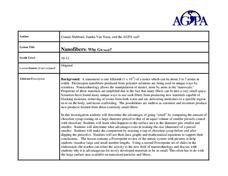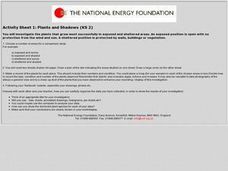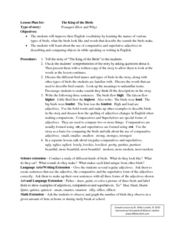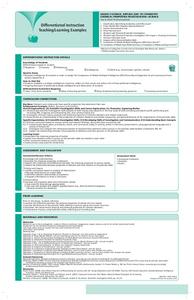Curated OER
Holey Story
Sixth graders create a cloze activity based on an article of a current event. They switch worksheets and the next group chooses the words they feel are missing and justify their word choices.
Curated OER
Nanofibers: Why Go Small?
Students explore the surface ratio of an object. In this surface area to volume lesson students construct a data table, make calculations and create a graph.
Curated OER
Hear the Wave!
Students study sound and ear function. In this sound functions instructional activity, students investigate soundwaves by completing various experiments. Students participate in a number of sound stations and complete the comparison...
Curated OER
Market Structure: Oligopolies
Students investigate the structure of oligopolistic markets. The business market is explored in order to make a comparison to accepted theory found in textbooks. An overall picture of the market is then created within the student mind to...
Curated OER
Fingerprinting
Students create a fingerprint card of each of their fingers using a pencil, special paper and tape. A comparison is made with their fingerprints to that of their classmates. They have to analyze how the prints are similar and different.
Curated OER
Salinity
Learners define and discuss salinity, conduct classroom experiment to determine salinity of water sample by using hydrometer, record predictions, and demonstrate understanding of how salinity influences object's ability to float in water.
Curated OER
Plants and Shadows
In this science worksheet, students design an experiment to measure the effects of sunlight exposure upon plants while comparing the amount of shade as a correlation.
Curated OER
A Tall Ship and a Star to Steer Her By
Students create a water transportation device powered by wind. In this wind power lesson, students research transportation concepts after reading the poem "Sea Fever" by John Masefield. Students design the fastest sailboat they can...
Curated OER
Which Objects Will Sink or Float?
First graders work in cooperative groups and utilize a variety of materials to test objects ability to sink or float. In this sink or float lesson, 1st graders discover why some object sink and others float. Students will graph results...
Curated OER
Guess What?!
Students explore how scientists work. In this scientific method activity, students use their senses to identify objects they cannot see. Students are asked to think like scientists and make observations, comparisons, and interferences,...
Curated OER
Biomass: The Energy of the Future
Students research renewable fuels. In this alternative energy instructional activity, students compile information and create a comparison chart on renewable resources. This instructional activity includes additional suggested readings,...
Curated OER
Acid Rain Lesson Plan Activity 2 - Understanding the Difference Between an Acid And a Base
Students experiment to determine the difference between an acid and a base. They study the concept of adding a buffering agent to make an acid more basic. They study the pH scale.
Curated OER
Using the senses
Students use their senses to compare a frog and a hamster. In this animals comparison lesson plan, students get into groups and observe, smell, feel, and listen to what their animals are like, and classify them into categories.
Curated OER
The Cell - Internet Activity
For this cells worksheet, students click on the links to learn about the plant and animal cells complete a comparison chart and answer short answer questions about it. Students complete 10 questions total.
Curated OER
Birds of Fields, Fencecrows, and Meadows
In this feathers worksheet, students complete a comparison table where they compare the feathers of 2 different kinds of birds. Students complete 3 columns in the table.
Curated OER
Does salt have an effect on the temperature of ice?
Learners explore the effect that salt has on the temperature of ice. In this scientific inquiry instructional activity, students observe an experiment to see how cold ice can get when salt is added. Learners then explore how the ice...
Curated OER
Historical Comparison of Anti-War Music
High schoolers explain that, how in this world of increasing awareness and interdependence, music can act as a magnet to draw people together. They research and compare anti-war songs from many different generations.
Curated OER
The King of the Birds vocabulary
Science and language skills come together in The King of the Birds. After reading, discuss the names and types of birds in the story and write given sentences to portray the difference between comparative and superlative adjectives....
Curated OER
Water Quality Comparison of Pulpit Rock Stream and Welton Falls
Eighth graders analyze different water samples given to them by their teacher.
Curated OER
How is a Hot Dog Like a Shoe?
Students create and explain analogies that reveal the depth of their understanding of new concepts.
Curated OER
Mission Planning: Earth/Mars Comparisons
Students compare and contrast conditions on Mars to those on our own planet, specifically, their local or regional environments. The physical characteristics, the atmosphere, and other astronomical data is considered.
Curated OER
3-2-1 Pop!
Students investigate how rocket liftoff demonstrates Newton's Laws of Motion. They participate in a class discussion, and construct a rocket powered by the pressure generated from an antacid tablet reacting with water.
EduGAINs
Chemical Properties Investigation
This lesson demonstrates differentiated instruction at its best. Over the course of 2-3 class periods, young chemists have the opportunity to gain a thorough understanding of metals and their chemical properties from a variety of...
Cornell University
Atomic Bonding
Explore the connection of surface area to bonding within atoms. Learners complete lab investigations to model changing surface area with different sizes and concentrations of atoms. A flour fireball demonstration follows the labs to...

























